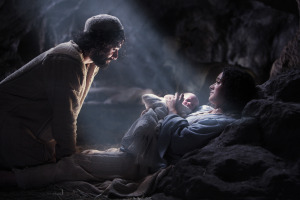 This weekend, I preached on Mary’s Magnificat (audio, Luke 1:46-55) at our church in the wake of the school shooting in Connecticut. The title of my sermon was “His mercy is for those who fear Him,” which is a line in the middle of Mary’s song. The reason that we live in an unsafe world is because people don’t fear God. There are a lot of other systemic and cultural factors at play to be sure, but I still think that fundamental theological statement holds true. Now I mean something very specific by “fearing God,” as those of you who have been following my trail are aware. It is not that we ought to be afraid of God, because when dread is the motivation for behavior, people do good only begrudgingly and with mediocrity. It is rather the fear that is awe and wonder at God’s majesty that builds sanctuaries of people who can speak the truth in love to one another and thus live in safety. And it is when we live in this awe and wonder that we discover the depths of God’s mercy and make it our lives’ work to help spread the reign of this mercy. That is how I interpret Mary’s statement that His mercy is for those who fear Him. Mary’s Magnificat shows us the path into the holy fear that discovers mercy. Here are the points I made in my sermon as my interpretation of the clues in Mary’s words.
This weekend, I preached on Mary’s Magnificat (audio, Luke 1:46-55) at our church in the wake of the school shooting in Connecticut. The title of my sermon was “His mercy is for those who fear Him,” which is a line in the middle of Mary’s song. The reason that we live in an unsafe world is because people don’t fear God. There are a lot of other systemic and cultural factors at play to be sure, but I still think that fundamental theological statement holds true. Now I mean something very specific by “fearing God,” as those of you who have been following my trail are aware. It is not that we ought to be afraid of God, because when dread is the motivation for behavior, people do good only begrudgingly and with mediocrity. It is rather the fear that is awe and wonder at God’s majesty that builds sanctuaries of people who can speak the truth in love to one another and thus live in safety. And it is when we live in this awe and wonder that we discover the depths of God’s mercy and make it our lives’ work to help spread the reign of this mercy. That is how I interpret Mary’s statement that His mercy is for those who fear Him. Mary’s Magnificat shows us the path into the holy fear that discovers mercy. Here are the points I made in my sermon as my interpretation of the clues in Mary’s words.
1) Christmas is not a story about us
“He has helped his servant Israel, in remembrance of his mercy, according to the promise he made to our ancestors, to Abraham and to his descendants for ever.” Luke 1:54-55
Too often Christians want for Christmas to be an affirmation of us and our tribe. We mourn the fact that clerks at the department store now say “Happy holidays” instead of “Merry Christmas” because it means that we’ve stopped being the unofficial default religion of a country that officially separates church and state. “Holiday” is “holy day” mashed into one word; Christmas stopped being a holy day when it started getting celebrated in department stores. But the first thing we need to remember is that Christmas is not about us. It’s about God keeping His promise to Abraham and the Israelites to send them a messiah. Most of us are Gentiles whose adoption into Abraham’s family is a tremendous act of God’s mercy. The attitude of entitlement needs to stop.
2) We are not the source of our goodness
“He has scattered the proud in the thoughts of their hearts.” Luke 1:51
The greatest obstacle to the fear of God by which we discover His mercy is our delusion that we are our own creators, “self-made” men or women. God has been at work in our lives constantly, empowering every good that we’ve ever done. That’s just what He does as our Creator and the constant source of our being. We are denying this reality when we view our achievements as some kind of currency that earns indebtedness from God and other people. This state of denial is called spiritual pride. I have been in a spirited discussion with one of my new readers on the topic of spiritual pride. The reason why I’m a stick in the mud about using the term “pride” rather than “arrogance” is because the problem is not just being insufferably boastful about myself. Measuring my worth according to the good I accomplish is itself a problem. My worth comes from the fact that my Creator loves me beyond measure; the good I accomplish is God’s achievement and gift to me. Understanding my life in this way is unfathomably liberating.
3) We are created to worship God
“My soul magnifies the Lord,and my spirit rejoices in God my Saviour.” Luke 1:46
This statement that Mary makes captures in a nutshell our vocation as human creatures. We are doing what makes us the most happy as creatures when we sing the song of our Creator and rejoice in God. This is not because God is a neurotic tyrant who needs to be constantly flattered. This is where our anthropomorphic analogies for God fail. He’s not an old man sitting on a throne somewhere who gets mad and throws things when people stop kissing up to Him. God is rather perfect beauty, truth, and goodness, and as such, He is the entity behind all created things that makes us laugh, cheer, and love. The problem is that we get fixated on or even addicted to particular created things in which we have tasted God’s goodness, but when that fixation or addiction takes over, the delight evaporates and the created thing becomes a source of slavery. That’s what idolatry is, whether the idol is our career, our children’s success at sports, our sex life, or something else. The hardest idol to be liberated from is our own ego. We can enjoy God within and through His creation. It’s not as though we have to go sit in a cave somewhere and detach ourselves from material reality. But engaging in regular acts of worship and devotion help us to engage in creation worshipfully. Just to be clear, this is not something we are doing to prove anything to God; it is rather the way of living that results in the greatest joy and peace inside ourselves.
4) God cannot be bought“He has filled the hungry with good things, and sent the rich away empty.” Luke 1:53
One of the emptiest pursuits in which people engage is the attempt to buy power and glory through their sacrifices, whether it’s money or time. All of us have a basic hunger to be useful and to do something meaningful with our lives; there is no shame in that. The problem is when we pretend to do good purely as a sacrifice and do not acknowledge the benefit we are receiving from being allowed to participate in good. If we engage in gestures of piety and service in order to win God’s favor, then we will always be “sent away empty,” just like the Pharisees who do their deeds before others to be seen and thus “receive their reward in fall.” The way that I am “filled with good things” is when I look upon every opportunity to serve God and other people as a true gift and consider it a sign of God’s mercy to me that He was willing to use even me.
5) God only offers gifts
“He has looked with favour on the lowliness of his servant.” Luke 1:48
This sentence captures the simple gratitude that you feel when you discover God’s mercy, the fact that He doesn’t do rewards, but only offers gifts. The paradox is when I experience every aspect of my life as a gift, then I am going to be more motivated to live in holiness and virtue than if I am doing so under the burden of trying to earn a reward from God. Now here’s the tricky thing. If someone goes around talking very conspicuously about how “lowly” they are and how much God has blessed them, this is often proof of their insincerity. People who really are thankful that God has decided to use them have no need to let everyone know how “humble” they are. They may share testimony about God’s providence for the sake of others’ encouragement when the time is appropriate, but they aren’t looking at every moment to earn piety points by saying the “right” thing about God.
6) Our king makes us equal by putting Himself beneath us
“He has brought down the powerful from their thrones, and lifted up the lowly.” Luke 1:52
This prophecy of Mary’s is fulfilled in the two groups of people who come to pay tribute to the baby Jesus: the magi from the East who came down from their thrones to kneel before a poor Jewish kid and the shepherds from the hillsides who gained the tremendous honor to be the first to meet the world’s savior. It is not through any means of violence that Jesus knocks down the powerful and exalts the lowly, but rather by coming to us as a helpless baby. Granted, it is very rare for Jesus’ church to look much like the egalitarian environment of servanthood to which He has called us. Usually “servanthood” in the church involves the same people who are powerful and important in the secular world taking charge and patronizing the less fortunate. But His call remains for us to kneel before a filthy manger if we want to find the mercy we are looking for.
7) We receive as much as we submit
“His mercy is for those who fear Him.” Luke 1:50
The object of our fear is a king who came to us as a baby. It’s a lot easier to be “afraid” (or enjoy making others afraid) of a powerful tyrant deity who we project onto the universe (with all our prejudices and priorities). To fear a king who made Himself into a filthy baby is scandalous. For those of us who need to feel macho, it’s insulting. But I think it’s a helpful corrective and assurance that we aren’t worshiping our own fantasy warrior god to think of the Christ child as the object of our fear at least during the Christmas season in which we emphasize Jesus’ incarnation over His cross and resurrection. If you’re able to humble yourself to a divine child, then you will be able to hear the still small voice of God and taste the mercy which is always there but is so often ignored. God doesn’t wants us to cower in front of Him; He wants us to be as devoted to His will as Mary was to every need that her baby had. That is the fear that knows God’s mercy.












